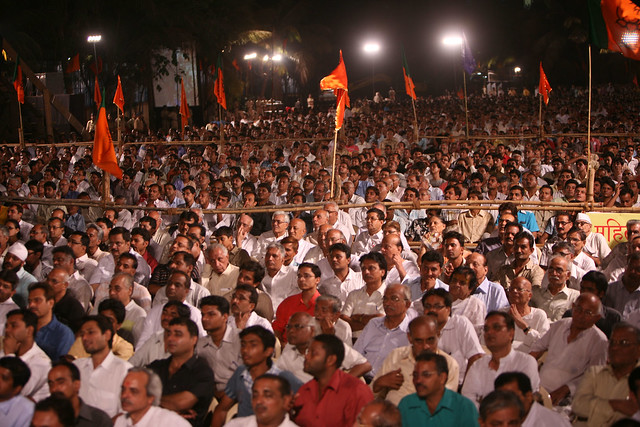In this book Ashis Nandy considers a new India, where the fate of the country is largely decided by its political culture that has become the domain of two predominant psychological states: narcissism and despair. Looking at the nationalism of Gandhi and Tagore, Savarkar, and Madanlal Pahwa, and cultural psychology, terror and counter-terror, humiliation and human degradation, happiness, and modernity and the sense of loss, the essays aim to open up the future for the next generation of intellectuals and political activists in India and in other societies. Reviewed by Anupama Ranawana.
 Regimes of Narcissism, Regimes of Despair. Ashis Nandy. Oxford University Press. March 2013.
Regimes of Narcissism, Regimes of Despair. Ashis Nandy. Oxford University Press. March 2013.
Indian social theorist Ashis Nandy‘s profound intellect has stretched itself to cover a variety of topics over the years, from cricket, to food and communal riots. The Tao of Cricket, published in 2000, meditates on various aspects of the game – history, philosophy, players – and its reach into mass culture, whilst An Ambiguous Journey to the City, published in 2007, examines the often mythic and complicated relationship between urban and rural India. Nandy is by profession a clinical psychoanalyst with an intense interest in human subjectivities and human society, thus lending himself ably to a pansophical analysis of the world surrounding him. For today’s post-9/11 world, faced with the prospect of another war in the Middle East, austerity protests and resurgent nationalist struggles, and dialogues about secular failure and post-secular ideas, Regimes of Narcissism, Regimes of Despair will prove pertinent reading.
The book is presented as a series of essays, extended from previous public lectures, and is therefore also an excellent introduction to Nandy’s thought processes. Nandy writes like a storyteller, and whilst the analysis is deeply profound, the style is eminently accessible. Indeed, every essay is littered with illustrative anecdotes. For academics and students interested in the nexus of nationalism, secularity and religiosity, especially, this will prove to be a provocative text. This is not least for Nandy’s careful dissection of nationalism and patriotism in the essay “Nationalism, Genuine and Spurious” which deals with the visions of Gandhi and Tagore, both for whom nationalism was ideology, and patriotism was sentiment. Essays that will prove valuable for those studying politics and religion include “Return of the Sacred” and “Modernity and the Sense of Loss” which enquire into the political geography of religion, and dwell on the process of how the ‘modernity’ of traditions has become a source of cultural pride, and a prop for cultural nationalism.
Providing a distinct pathos throughout the book, are the themes of loss, and a journey to ‘recover’. This is not only evident in Nandy’s analysis of the motivations of nationalists, patriots and religious citizens, but also forms an umbrella frame for the writer’s own encounter with modern society. Nandy identifies two predominant psychological states in modern political culture: that of narcissism and that of despair, which he sees as having become institutionalized not only amongst individual communities but within the bureaucratic state. Thus, the titular ‘regimes’ of narcissism and despair.

Each essay then continues an examination of these socio-political moments as both mass ideologies and as vectors in the inner life of individuals. It is important to point out that Nandy’s own definition of political ideologies is that of the psychoanalyst, and his preface directs the reader to remember that the inspiration for much of this work is his discomfort with which secular political ideologies have ‘taken a much higher toll’ of human lives than religious fanaticism. According to Nandy, a blanket condition of social flux and moral isolation sees society living with a constant sense of loss, anxiety and repressed anger. The abandonment – or perhaps an alienation from – certain ethical and moral values have lent themselves to the containment of anger through consumerism and abandonment to a world of total entertainment, resulting in a narrowing of the cultural sensitivities of the globalised middle class. Indeed, Nandy seems preoccupied with the idea that such despair has reinforced evil. In “Terror, Counter-Terror, and Self-Destruction”, he emphasizes Baudrillard’s claim that “evil is there, everywhere as an obscure object of desire.” As an example he cites suicide bombers, who, thriving on a psychology of this worldly individualism and narcissism now appear only as wanton, ‘evil’ terrorists.
In the eight essays presented here, therefore, Nandy traces the psychologies of despair and narcisssism through issues ranging from nationalism through terrorism and counter-terrorism, ideologies of humiliation and happiness, notions of the sacred in religion, ideas of tradition and modernity — wrought together in terms of Nandy’s usual interrogative stance of the relationship between the individual and the nation. Whilst the scope and analysis of these essays in no doubt international and performs an encounter with the globalization of thought and social interaction, Nandy draws often from India and Indian history in order to illustrate his positions. As such, someone unfamiliar with a broader understanding of India may experience some distancing from the text. For example, in “The Demonic and Seductive in Religious Nationalism” and “Coming Home” Nandy uses the lives of two controversial political figures — Vinayak Damodar Savarkar and Madanlal Pahwa — in order to explore the deeper psychological reaches of violence and religious nationalism.
Yet, other essays return us to consider, broadly, long-ranging historical despair. The essay “Humiliation”, for example, explores the consequence of colonial burden and shame and their impact on political culture; it traverses the experiences of rape victims, blacks, dalits as part of the spectrum of dehumanisation in political history. This dehumanisation, being subject to individual volition and effort has come to mean that seeking happiness is only a linear path. Modern society can only be happy when all unhappiness is negated, and therefore we are constantly in despair. The pathological outreach to therapy, and the consumerisation of happiness has meant that the global middle class has manipulated happiness into a manageable, malleable, psychological variable. This pathological unhappiness itself is further imbricated by the loss of a certain set of ethical and moral values.
Ashis Nandy’s work has always demonstrated a provocative, intriguing and yet discomfiting intellect. Regimes of Narcissism, Regimes of Despair certainly serves to strengthen one’s readiness to always be so winningly ruffled by his panoptic gaze on human society.
———————————————
Anupama Ranawana studies the small voices in Religion and International Relations for her doctoral thesis at the University of Aberdeen. With the rest of her time she is involved as an activist in the conversation on human rights, nationalism, and cultural politics in South Asia, particularly Sri Lanka. Anupama tweets @MsAMR25. Read more reviews by Anupama.







1 Comments